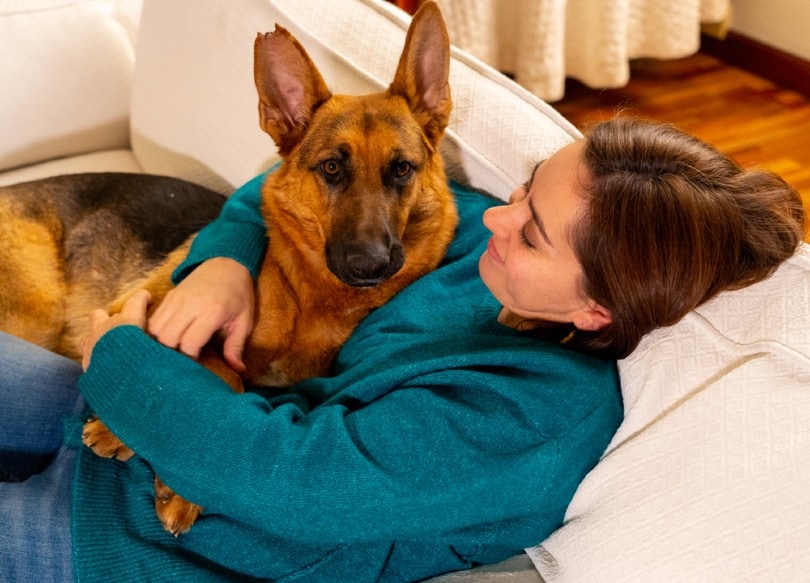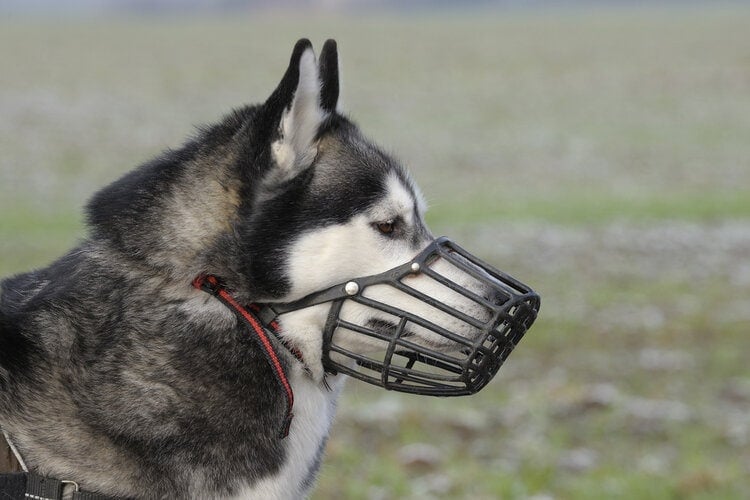Do German Shepherds Make Good Service and Therapy Dogs?
Updated on

German Shepherds are very devoted and intelligent, which can theoretically make them good therapy dogs. They can learn many of the advanced commands that are necessary for therapy and service work with little effort.
There is a reason these dogs are commonly used for protection work, however. They have powerful territorial instincts and aren’t trusting of other people. Therefore, they do require extensive socialization to be service dogs and may not be the best choice.
They aren’t helpful as therapy dogs, though. They aren’t as trusting and affectionate towards strangers as therapy dogs need to be. They tend to be more aloof than anything.
However, not all German Shepherds can be used as therapy dogs. They don’t all have the temperament for this sort of work. Service animals have an exceptional temperament.
No breed produces dogs that will always be suitable service animals. Many service animals fail the course.
What Traits Make Good Service Dogs?
There are a few requirements for all service dogs. To make it a service animal, they require certain traits.
Plenty of dogs may seem like great service dogs at first – but then fail their training later. For this reason, all dogs are subjected to a temperament test at the beginning of their training. If they don’t pass, they won’t be allowed to continue the training.
- Energetic
- Willing
- Calm
- Enjoys people
- Anxious
- Focused
During the temperament test, the dog will be exposed to various potentially scary sounds and situations. Umbrellas are a standard inclusion, for instance. Loud noises are often made while the dog is playing to determine if they will cower around louder noises.
Trainers will often check the dog’s response to pain. Dogs are often jostled and accidentally stepped on in public. Therefore, they mustn’t automatically snap when injured.
Dogs that make good service animals may yelp if they are hurt – but won’t run away or bite.
Often, the dogs are also tested to see if they will play fetch. This makes it much easier for dogs to learn to find things for their owners, which is often crucial for service work.

German Shepherd Service Dog Training
If the German Shepherd passes through the temperament test, they will need to pass through the service animal testing as well.
The exact training a service dog will receive depends on what sort of disability they’ll be used for. Often, there is a specific disability in mind when the dog is being trained. Occasionally, the dogs may be trained for a particular person, who will have specific requirements for their dog.
Service dogs can perform many different tasks. For instance, they can be guide dogs for the blind, pull wheelchairs, or alert owners about seizures. People with diabetes use some dogs to warn them if their blood sugar drops too low.
Dogs likely also need familiarity with familiar public places. Many of those living in cities need to use public transportation. Shopping centers, elevators, and busy streets are all common areas that the dogs need contact with.
What’s the Difference Between Service Dogs and Therapy Dogs?
There is a significant difference between therapy dogs and service dogs.
Service dogs are trained to perform a particular task for a particular person. They are required for their owner’s wellbeing. They have access to public places, as their owners require them.
However, therapy dogs are very different. They are not designed to perform a particular task for a particular person. Instead, they provide affection for people in hospitals, retirement homes, schools, and similar areas. They’re stress-relief – pure and simple.
Some therapy dogs are utilized by libraries for reading, for instance.
They don’t have access to public spaces, though. Therapy dogs need permission before they are allowed into any public space, whereas service dogs do not. Typically, therapy dogs have to be “working” in order to be let in places where animals are otherwise not allowed. They can’t just go into a school because they want to, for example.
Therapy dogs are not required to access any public space. They aren’t allowed in places where other dogs aren’t allowed. They don’t have any special privileges, whereas service dogs do.

Are German Shepherds Good Therapy Dogs?
German Shepherds, while highly skilled at so many roles, are not ideal therapy dogs. German Shepherds are not as friendly as some other breeds. They are often quite aloof towards strangers and probably aren’t very affectionate towards random people in hospitals.
Therefore, we don’t recommend German Shepherds ever be used for therapy work. It isn’t that they can’t do it. They aren’t as suitable for the job as other breeds.
You’re much better off choosing a Golden Retriever, a Labrador, or something similar.
German Shepherd Therapy Dog Training
Usually, therapy dogs are trained by their owners. They may be sent to an obedient school, but this is often not done. There isn’t much money to be made for therapy dogs. They don’t cost any more than normal dogs – and there isn’t a niche market looking for therapy dogs.
There are usually plenty of therapy dogs in town to manage the visits to hospitals and other areas.
Obedience training is often the basis for therapy animals. Your dog should complete basic therapy training before you move on to specific therapy training.
Usually, therapy training involves getting the dogs used to the environment of hospitals, schools, and similar places. They are involved heavily in visiting public places during this time. Usually, they will be labeled as “therapy dogs in training.”
Many hospitals and schools allow dogs to enter the school and other public places at this stage for training purposes, but only during specific periods. They are not allowed to walk in and out of hospitals as they feel free, for instance. Appointments are often required.

Are German Shepherd Dogs Good for Work with Disabled People?
German Shepherds are larger breeds, so they often work well for those who have mobility problems. They can help pull wheelchairs and provide extra support for people walking down steps. However, other breeds can perform these tasks – often better.
German Shepherds aren’t best for working out in public since they aren’t entirely accepting of strangers.
Some German Shepherds are great service dogs – it just depends on their temperament. Temperament testing is essential to determine if these dogs will ever pass their training. There is little reason to commit a dog to training if they don’t have the temperament for it anyway!
German Shepherd Service Dogs for PTSD
They can – but not necessarily better than other dogs. They still require extensive socialization and training. These dogs may be more heavily associated with police and military work, but that doesn’t necessarily mean they make suitable PTSD dogs.
These canines can be quite protective and may alarm their owners when they start becoming aggressive. Some German Shepherds are less likely to do this than others dogs. Again, it largely depends on the temperament.
If you’re looking for a PTSD dog, we recommend choosing a different breed. If you already have a German Shepherd, they may be suitable. However, you typically need to purchase an already trained dog for PTSD.
Dogs that were previously pets usually don’t pass the temperament tests necessary to become service dogs.
What Breeds Make Good Service Dogs?
Several breeds are typically better service animals than German Shepherds. For instance, Labrador Retrievers are standard options. They are suitable for all sorts of service work. For instance, they are commonly used as seeing-eye dogs.
They are friendly and very devoted to their people. Therefore, they are much better than German Shepherds when strangers are involved. You can socialize a German Shepherd to a point, but you’ll never get them at the same level as a Labrador Retriever.
Conclusion
German Shepherds can occasionally make good service and therapy dogs. However, they are prone to failing the temperament test – even when socialized from a young age. They have higher territorial instincts than other dogs, which can make them untrusting of strangers.
When you plan on having a dog work in public, it usually isn’t recommended to choose a potentially territorial breed. Friendly breeds like Labrador retrievers are often much better options. They are often better therapy dogs for this reason.
Poodles, Golden Retrievers, Pomeranians, and Greyhounds are often better animals for service and therapy pets.
In many cases, you cannot train a dog for service work if you have already adopted them. Service animal organizations often have suppliers for their puppies that they trust. Pet dogs often don’t pass the temperament test – especially if they are German Shepherds.
Therefore, we recommend choosing a service dog from an organization that trains them – not purchasing a puppy with the assumption that it’ll be a service animal. Many puppies don’t pass the temperament and training required.
Your best bet is to purchase a dog that’s already trained.
Related Reads:
- American vs European German Shepherds: What’s the Difference? (with Pictures)
- Working Line vs Show Line German Shepherds: What’s the Difference? (with Pictures)
Featured Image Credit: Sam Wordley, Shutterstock












